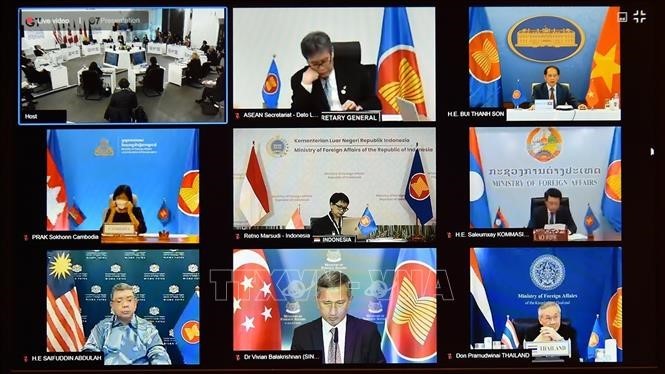(VOVWORLD) - The Foreign Ministers Meeting of the Group of 7 (G7) reached a new milestone when, for the first time, it invited the foreign ministers of ASEAN countries, except Myanmar, to attend a combined face-to-face and online meeting on Sunday in Liverpool, the UK, in order to foster economic and political ties between the G7 and ASEAN.
 ASEAN Foreign Ministers virtually attend the G7 Foreign Ministers Meeting on December 12, 2021. (photo: VNA) ASEAN Foreign Ministers virtually attend the G7 Foreign Ministers Meeting on December 12, 2021. (photo: VNA) |
The "Global Britain" strategy of the UK, who is the current rotating chair of the G7, emphasizes the Asia-Pacific region’s role by promoting G7-ASEAN connectivity.
ASEAN’s growing role
Inviting the ASEAN Foreign Ministers to the G7 Foreign Ministers Meeting reflects ASEAN’s growing importance in economics and geo-politics. ASEAN has been a community of dynamic economies with solid development for many years. Its strong economic development is expected to continue. Its population of nearly 700 million people and GDP of 2.5 trillion USD make ASEAN a large market with huge potential.
ASEAN’s importance has grown during the pandemic because the world's biggest economies have seen an urgent need to diversify global supply chains and avoid dependence on just 1 or 2 partners. ASEAN can meet this need. ASEAN’s economic role has become more important as other countries have scrambled to restructure their strategic supply chains.
The G7’s interest in ASEAN right now is also due to geopolitical considerations. As the US-China competition becomes sharper, ASEAN has become a measure of their influence. The G7, of which the US and the UK are the most active members, wants to improve its relations with ASEAN to serve its political purposes. The US and the UK want to know ASEAN’s thoughts about their establishing the AUKUS security alliance and equipping Australia, a country adjacent to ASEAN, with nuclear-powered submarines.
Analysts say the G7-ASEAN Foreign Ministers Meeting is the G7’s first step toward ensuring ASEAN’s support. After the meeting, US Secretary of State Anthony Blinken will visit Southeast Asia and President Joe Biden is planning to host an in-person summit with ASEAN leaders early next year. These are clear signs of ASEAN’s increasing importance to the G7.
Practical agreements
The G7 accounts for about half of global GDP. Japan has long been a strategic partner of many ASEAN nations.
ASEAN allows G7 countries to diversify their strategic supply chains and reduce the risk of relying on too few partners. ASEAN also offers very strong potential for infrastructure cooperation.
At a summit in June in the UK, the G7 announced a Build Back Better World (B3W) strategic plan, which includes mobilizing 40 trillion USD to support infrastructure and technology projects toward sustainable management, environmental friendliness, and financial transparency. The strategy will benefit ASEAN because most ASEAN members are developing countries in need of capital, technology, and advanced managerial skills.
G7-ASEAN cooperation will focus on infrastructure construction and investment in clean and renewable energy in accordance with ASEAN’s commitments on cutting carbon dioxide emissions.
Healthcare is also a priority for cooperation that the G7 can promote with ASEAN, especially during the COVID-19 epidemic. The G7 has provided vaccines to many ASEAN countries. In the long term the G7 can transfer vaccine production technology, build vaccine production centers in Southeast Asia, and strengthen cooperation with pandemic prevention and control centers. Both sides have agreed to invest in new technology and innovation to create momentum for recovery and growth, digital economic development, green economy, and climate change response, and have underscored the importance of maintaining peace, stability, security, safety, and freedom of aviation and navigation in the East Sea and supported dialogue and trust building, self-restraint, and resolving disputes by peaceful measures based on international law, including the 1982 UN Convention on the Law of the Sea.
In inviting the Foreign Ministers to the G7 meeting, British Foreign Minister Liz Truss said London wants to build a worldwide network and encourages like-minded countries to work together from a position of strength.